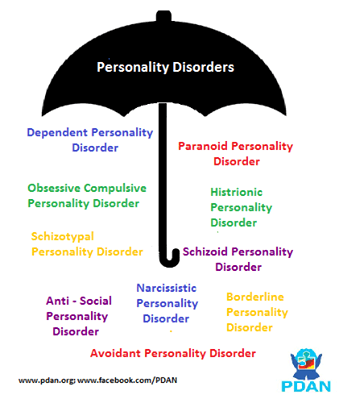Personality disorders are a group of mental health conditions that are characterized by inflexible and unhealthy patterns of thinking, feeling, and behaving. These inner experiences and behaviors often differ from the expectations of the culture in which someone lives.
People with personality disorders usually have a hard time getting along with others and dealing with everyday problems in the ways that are expected by a cultural group. They commonly believe that their way of thinking and behaving is completely normal. However, they tend to have a view of the world that is quite different than others. As a result, they may find it difficult to participate in social, educational, and family activities. They also place blame on others for their challenges. These behaviors and attitudes often cause problems and limitations in relationships, social encounters, and work or school settings. They may also make people with personality disorders feel isolated, which can contribute to depression and anxiety.
There are numerous different types of personality disorders. They are grouped into three clusters based on similar characteristics and symptoms. Some people may have signs and symptoms of multiple personality disorders.
Personality disorders tend to appear in adolescence or early adulthood, continue over many years, and can cause a great deal of distress. They can potentially cause enormous conflict with other people, impacting relationships, social situations, and life goals. People with personality disorders often don't recognize that they have problems and are often confusing and frustrating to people around them (including clinicians).
Certain symptoms of personality disorders can fall into two categories: self-identity and interpersonal functioning.
Self-identity problems include:
Interpersonal problems include:

Treatment can vary depending on the type and severity of your personality disorder. It may include psychotherapy and medications.
Psychotherapy, or talk therapy, may help in managing personality disorders. During psychotherapy, you and a therapist can discuss your condition, as well as your feelings and thoughts. This can provide you with insight on how to manage your symptoms and behaviors that interfere with your daily life.
There are many different types of psychotherapy. Dialectical behavior therapy can include group and individual sessions where people learn how to tolerate stress and improve relationships. Cognitive behavioral therapy aims to teach people how to change negative thinking patterns so they can better cope with everyday challenges.
There aren’t any drugs approved for the treatment of personality disorders. However, certain types of prescription medications might be helpful in reducing various personality disorder symptoms:
The most important aspect of treating a personality disorder is the recognition that the problem exists in the first place. People with these types of disorders believe that their personality traits are normal, so they can become quite upset when someone suggests that they may have a personality disorder.
If someone recognizes that they have a personality disorder and engages in treatment, they should see an improvement in their symptoms. It’s beneficial for friends or family members to be involved in their therapy sessions as well. It’s also important for someone with a personality disorder to avoid drinking alcohol and using illicit drugs. These substances can have a negative impact on emotions and interfere with treatment.
If you are close to someone you suspect might have a personality disorder, you should encourage them to seek help. They may get angry or defensive, but it’s important to avoid arguing with them. Instead, focus on expressing your feelings and voicing your concerns about their behaviors.
Call 911 if you ever feel that the other person intends to cause harm to themselves or others. It is also beneficial to tell your friend or loved one about the National Suicide Prevention Lifeline. This free, 24-hour phone line takes calls from anyone feeling depressed or anxious. A friendly, supportive voice can help them work through a difficult time or crisis.